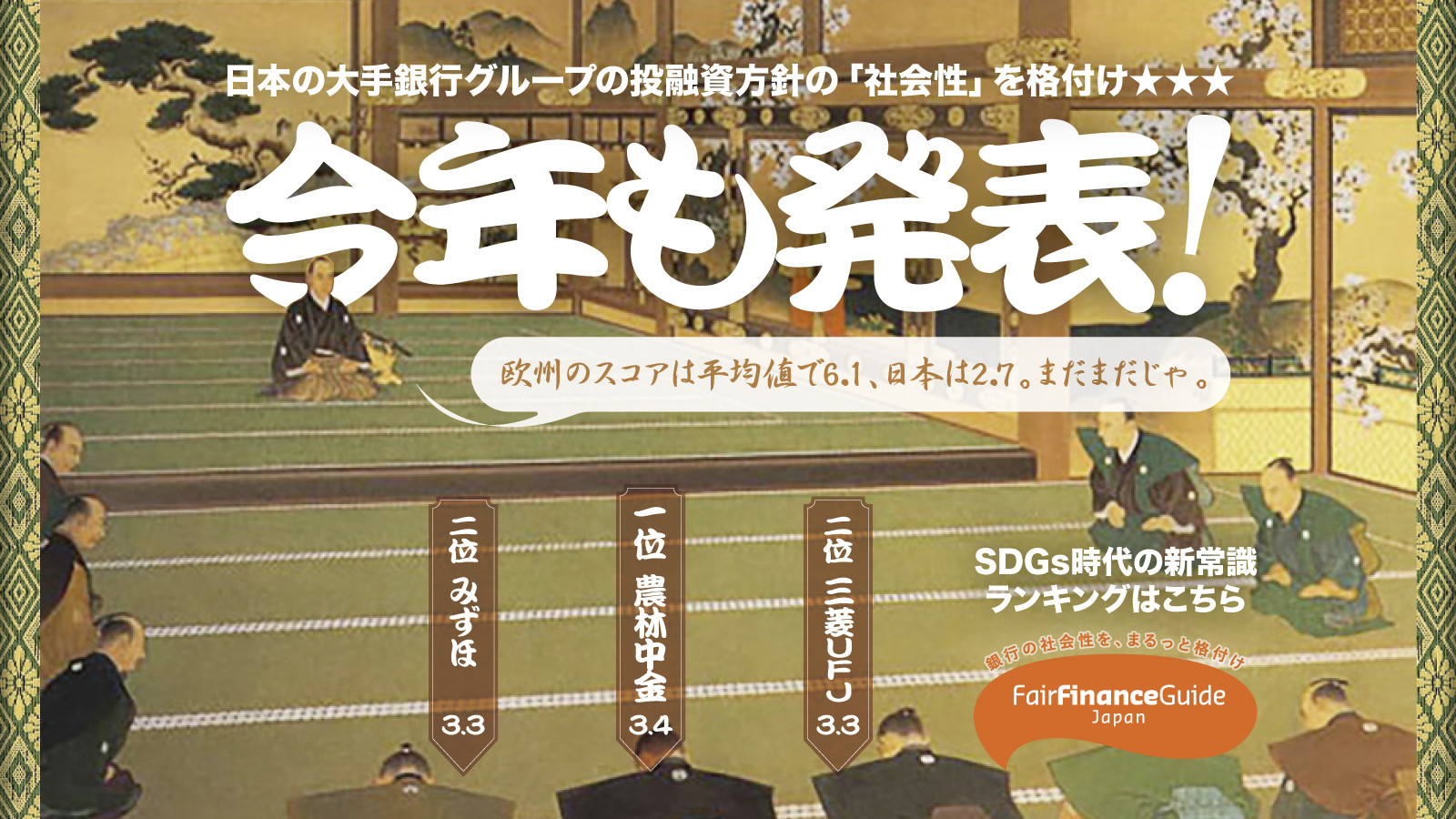
Key Highlights from the 2020 Policy Assessments on Sustainable Finance for Banks in Japan Using the Fair Finance Guide Methodology
Norinchukin Bank and Dai-ichi Life are among the top scoring financial institutions, according to a new set of scores published by Fair Finance Guide Japan, a coalition of Japanese NGOs that shed light on investment/loan policies of major financial institutions. They score 3.4 and 3.3 out of ten (10) points respectively. Both financial institutions improved on their climate change policies, but still lag far behind their European counterparts who score at an average of 6.1 points.
Among the banks, Mitsubishi UFJ, Mizuho and Sumitomo Mitsui Trust are close in line, but Norinchukin’s more clear disclosure of policies made the difference. Among the insurance companies, Dai-ichi Life notably improved their score by clarifying that they expect investees to comply with the UN Global Compact and the OECD Guidelines for Multinational Enterprises. In addition to utilizing these international standards, Dai-ichi-Life also closely follows Japanese National Action Plan (NAP) on Business and human rights in investment decisions.


Key points from the Scores:
- Inhumane weaponry: Among target financial institutions, all but Meiji Yasuda Life and Tokio Marine disclosed a ban policy regarding cluster munition producers. Regarding nuclear weapons, Resona is the only institution to ban “developing, producing and maintaining” nuclear weaponry. Mitsubishi UFJ, Mizuho, SMBC and Sumitomo Mitsui Trust each have policies banning specifically the production of nuclear weapons. None of the eight insurance companies have policies on nuclear weapons.
- Palm oil: All banking groups except for Japan Post Bank utilize third party certification mechanisms for financing decisions. None of the insurance companies have disclosed policies.
- Coal-fired power generation: Japan Post Bank, Japan Post Insurance, Tokio Marine, MS&AD and SOMPO newly adopted policies to regulate project financing for new coal-fired power plants. With this commitment, all seven banks and eight insurance companies have established policies to limit coal financing. However, Mitsubishi UFJ, Mizuho, SMBC, Sumitomo Mitsui Trust, Japan Post Bank, Meiji Yasuda Life, Tokio Marine, MS&AD and SOMPO all have broad exceptions that puts their commitment into question.
- Consistency with the Paris Agreement: Subsidiaries of Mitsubishi UFJ and Sumitomo Mitsui Trust compared their portfolios with the 2-degree target from the Paris Agreement and disclosed that they will exceed the target GHG emission by 2042 and 2037 respectively. No other companies disclosed such research results and thus further research and disclosure is needed. Meanwhile, all companies are expected to swiftly review their portfolios to keep within the bounds of a 1.5-degree target.
———————————————————————————————————————————————————————————-
The Fair Finance Guide aims to bring race to the top between the CSR of financial institutions by scoring the sociality of investment and loan policies of major financial institutions and providing the results to the public in an easy-to-understand manner. Dutch NGOs started this initiative in 2009, and Japan has participated since 2014. Currently, the policy assessment is published in 12 countries.
Fair Finance Guide Japan is run by a network of non-profit organizations based in Japan: Alternative Peoples Linkage in Asia (APLA), Japan Center for a Sustainable Environment and Society (JACSES), Japan Tropical Forest Action Network (JATAN) and Pacific Asia Resource Center (PARC). This is a joint press release by these four organizations.
Contact:
Yuki Tanabe, Japan Center for a Sustainable Environment and Society (JACSES)
Email: tanabe@jacses.org